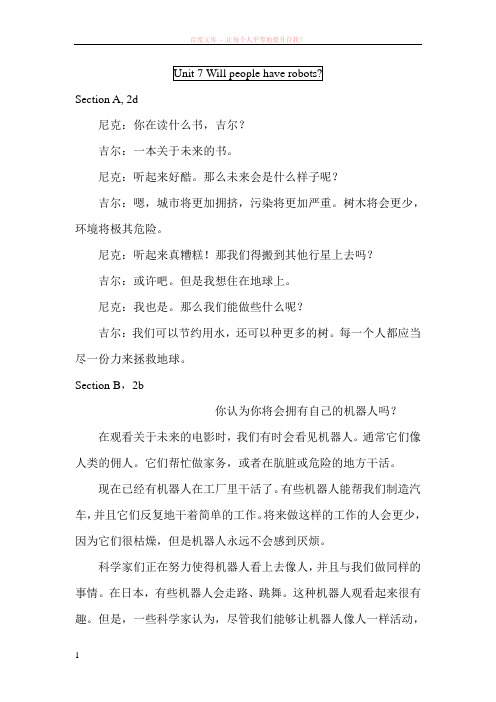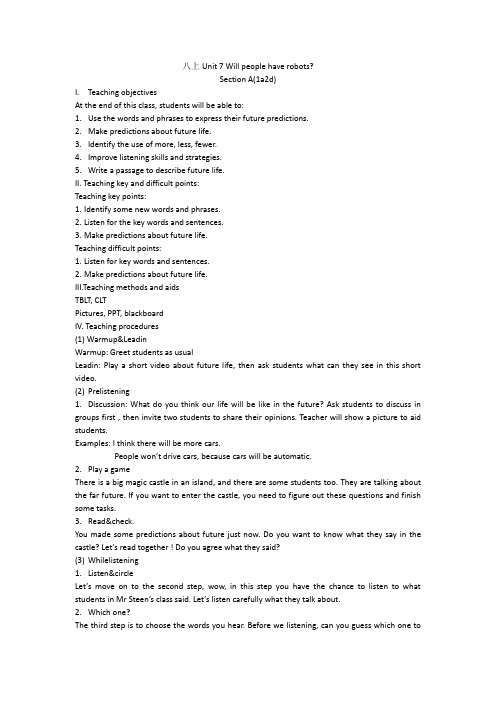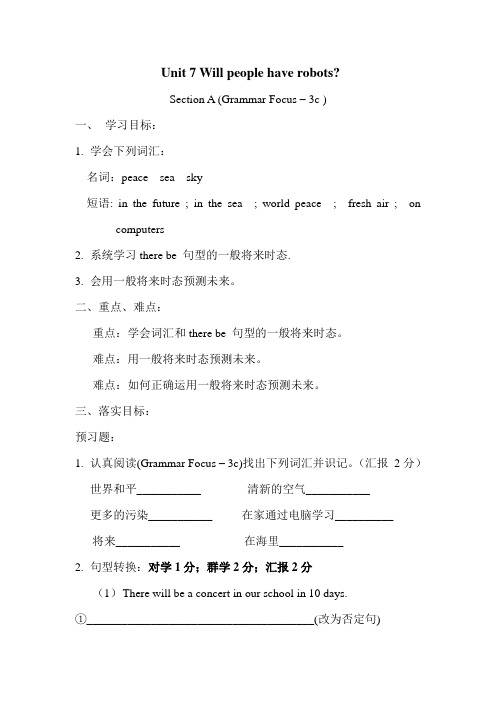Unit 7 will you have robots section A(2a--2c)
Unit 7 Will people have robots_ Section A 1a—2d教案

Section A 1a-2d【学习目标】1. 记住并会运用P49,50单词及短语2. 记住并会运用will+动词原形“表示将要做”任务一:单词(根据音标写单词,并记住它的中文意思)1. ______n.纸2.________行星3._______n.地球;泥土4.___________n.预测5. ________n.未来6.______n.污染7.___________ v.污染;污染物8.________n.&v.种植,植物9.______ 大概;或许;很可能10. _______ adj.人的; n.人;人类11. ________n.和平短语(英汉互译)6. 在电脑上________________7. 在纸上____________________8. 活到200岁________________ 9. 在未来_____________________10. 去学校________________ 11.待在家里______________________12.be only 200 yeas old___________ 13.be very big and crowded_______________ 14.in 100 years______________ 15.住在海里_____________________16.杀死动物________________ 17.更少的作业_____________________任务二: 看表,用more, less或fewer 完成练习。
1.There will be ___________ houses in 100 years .2.There will be ___________ pollution in 100 years.3 .There will be ___________ schools in 100 years.4.There will be ___________ people in 100 years.5.There will be ___________ snow in 100 years.6.There will be __________ movie theaters in 100 years.more, fewer 和less的用法注意:fewer 和less都表示“较少的”的意思,more 较多的不同点:1. fewer是few 的比较级,fewer+可数名词复数。
Will-people-have-robots说课稿

Unit 7 Will people have robots? (Section A) Good morning,Ladies and gentlemen:I’m honored to have the chance to share my teaching ideas with you。
My lesson is taken from unit 7 of book 1 for grade 8 junior high school. The title is “Will people have robots?”My teaching plan will include six parts。
They are teaching material analysis, analysis of the students,teaching methods, teaching procedures, blackboard design and teaching reflections.Part 1 teaching material analysis1. Status and functionThe theme of unit 7 is about “life in the future。
" Students will learn the usage of simple future tense and master how to make predictions. The contents can raise students’interest to express their ideas about the future with full imagination. It is related to the contents of unit 6 and unit 10, so unit 7 plays an important role in this book and simple future tense is always examined in tests.2。
unit_7_Will_people_have_robots_section_A

will happen.
1.Kids study at school now. In 100 years, ________________________ 2. I sometimes see blue skies in my city, but in the future_____________ 3. People now usually live to be about 7080 years old, but in the future__________ 4. Families usually spend time together on weekends, but maybe in 200 years _____________
Section A
Grammar Focus
To learn to use will + do To learn to use there will be To be able to predict city in the future with the words more, fewer, less
特殊疑问句: A: What will the future be like? B: Cities will be more crowded and polluted. A: What will your life be like in ten years? B: I think I’ll be an astronaut. A: Where will you live? B: I’ll live on a space station. A: When will she live for London? B: She’ll leave next Sunday.
unit7willpeoplehaverobots课文翻译 (1)

Unit 7 Will people have robots?Section A, 2d尼克:你在读什么书,吉尔?吉尔:一本关于未来的书。
尼克:听起来好酷。
那么未来会是什么样子呢?吉尔:嗯,城市将更加拥挤,污染将更加严重。
树木将会更少,环境将极其危险。
尼克:听起来真糟糕!那我们得搬到其他行星上去吗?吉尔:或许吧。
但是我想住在地球上。
尼克:我也是。
那么我们能做些什么呢?吉尔:我们可以节约用水,还可以种更多的树。
每一个人都应当尽一份力来拯救地球。
Section B,2b你认为你将会拥有自己的机器人吗?在观看关于未来的电影时,我们有时会看见机器人。
通常它们像人类的佣人。
它们帮忙做家务,或者在肮脏或危险的地方干活。
现在已经有机器人在工厂里干活了。
有些机器人能帮我们制造汽车,并且它们反复地干着简单的工作。
将来做这样的工作的人会更少,因为它们很枯燥,但是机器人永远不会感到厌烦。
科学家们正在努力使得机器人看上去像人,并且与我们做同样的事情。
在日本,有些机器人会走路、跳舞。
这种机器人观看起来很有趣。
但是,一些科学家认为,尽管我们能够让机器人像人一样活动,却很难让它们真的像人类那样思考。
例如,科学家詹姆斯·怀特认为,机器人永远不可能(像人一样)醒来后知道自己在哪里。
但是,很多科学家们不同意怀特先生的观点。
他们认为在25到50年之后,机器人甚至能够像人类那样说话。
一些科学家相信,未来会有更多的机器人。
然而,他们认为这可能需要数百年的时间。
这些新型机器人将会有很多不同的形状,有的会看起来像真人,其他的可能看起来像动物。
比如,在印度,科学家们已经制造出像蛇一样的机器人。
如果建筑物倒塌了,并且还有人在里面,这些蛇形机器人能够帮助搜寻埋在建筑物下面的人。
这在20年前还是不可能的事,不过在100年以前,电脑、火箭看上去似乎也是不可能的。
我们永远不知道未来会发生什么事!。
Unit7Willpeoplehaverobots_SectionA(1a-2d)教学设计人教版英语

八上Unit 7 Will people have robots?Section A(1a2d)I.Teaching objectivesAt the end of this class, students will be able to:e the words and phrases to express their future predictions.2.Make predictions about future life.3.Identify the use of more, less, fewer.4.Improve listening skills and strategies.5.Write a passage to describe future life.II. Teaching key and difficult points:Teaching key points:1.Identify some new words and phrases.2.Listen for the key words and sentences.3.Make predictions about future life.Teaching difficult points:1.Listen for key words and sentences.2.Make predictions about future life.III.Teaching methods and aidsTBLT, CLTPictures, PPT, blackboardIV. Teaching procedures(1) Warmup&LeadinWarmup: Greet students as usualLeadin: Play a short video about future life, then ask students what can they see in this short video.(2)Prelistening1.Discussion: What do you think our life will be like in the future? Ask students to discuss in groups first , then invite two students to share their opinions. Teacher will show a picture to aid students.Examples: I think there will be more cars.People won’t drive cars, because cars will be automatic.2.Play a gameThere is a big magic castle in an island, and there are some students too. They are talking about the far future. If you want to enter the castle, you need to figure out these questions and finish some tasks.3.Read&check.You made some predictions about future just now. Do you want to know what they say in the castle? Let’s read together ! Do you agree what they said?(3)Whilelistening1.Listen&circleLet’s move on to the second step, wow, in this step you have the chance to listen to what students in Mr Steen’s class said. Let’s listen carefully what they talk about.2.Which one?The third step is to choose the words you hear. Before we listening, can you guess which one tochoose?Okay, let’s listen to check your guessing. Can you read these sentences for them? They want to hear your beautiful voice.3.Right or wrong?In this step, you need to listen and check which prediction is right. You only have one chance, after listening please speak out loudly your answer.(4)Postlistening1.PracticeIn this step, you need to choose the right word to plete the sentences. Pay attention to the noun. You just have three minutes to finish them. Then the teacher invite five students to share their answers.2.Make conversationsIn this step, students need to make conversations with partners to share their ideas about future. They can use the information in 1a and 2a. Then invite two pairs to give presentations.3.AccidentThere appears a mysterious cat who can bring you to the castle, but you need to answer her questions first.1)What will the future be like according to the book about the future?2)What can people do to save the earth?Firstly, answer the two questions according to your imagination, then read the conversations to answer the questions.4.RoleplayWow, you arrive at the door of castle, but you can’t enter. You need to finish another task. Let’s role play the conversation with your partner. Then, the teacher divide students into two groups to role play the conversation.Congratulations! You succeed!(5)SummaryThe game is over, let’s summarize what we learned today!1)Words & phraseswill, won’t, robot, be free, on paper, live to be, predictions2)Sentences:1.People will have robots in their homes.2.Kids won’t go to school.3.I think there will be...3)Grammar focus:will/won’tless, fewer, more(6)HomeworkWritingWhat’s your prediction about the future?Please write a passage no less than 70 words to introduced your dream future.。
Unit 7 Will people have robotsSection A (Grammar Focus – 3c )

Unit 7 Will people have robots?Section A (Grammar Focus – 3c )一、学习目标:1.学会下列词汇:名词:peace sea sky短语: in the future ; in the sea ; world peace ; fresh air ; on computers2.系统学习there be 句型的一般将来时态.3.会用一般将来时态预测未来。
二、重点、难点:重点:学会词汇和there be 句型的一般将来时态。
难点:用一般将来时态预测未来。
难点:如何正确运用一般将来时态预测未来。
三、落实目标:预习题:1.认真阅读(Grammar Focus – 3c)找出下列词汇并识记。
(汇报2分)世界和平___________ 清新的空气___________更多的污染___________ 在家通过电脑学习__________将来___________ 在海里___________2.句型转换:对学1分;群学2分;汇报2分(1)T here will be a concert in our school in 10 days.①_______________________________________(改为否定句)②______________________________________(改为一般疑问句并做肯定及否定回答)_____________________ ___________________问题一,自学2分;对学2分;群学2分;汇报3分(各组3号准备汇报)there be句型的一般将来时态: 将会有……, 其结构为如下:(1) 肯定句:There will be +主语+其他.(2)否定句:There will not be +主语+其他. will not= won’t(3)一般疑问句:Will there be +主语+其他?肯定回答:Yes, there will.否定回答:No, there won’t.例如:肯定句: There will be more cars in the cities.否定句:There will not be more cars in the cities.一般疑问句:Will there be more cars in the cities?肯定回答:Yes, there will.否定回答:No, there won’t.四、巩固拓展:1.熟读Grammar Focus里的句子。
新目标英语八年级上册说课稿Unit7 Will people have robots Section A 1a-2d说课稿
⑤They won’t go to school.
Ⅴ. Listening
Work on 2a:
1. Read the sentences in 2a. Tell Ss they will listen to some sentences. They should listen and circle the words in the bracket.
4. Practice the conversation with their partner. Then let some pairs to act out the conversation.
purpose:学生能熟练操练本节课所学的关于未来的句子,并能激发出学生对地球现状的思考和对人类未来的规划。
4. Ask some pairs to act their conversations.
Ⅷ. Role-play
1. Read the conversations and answer the questions:
1) What will the future be like in the book?
2. Play the recording for the Ss to listen and circle the words.
3. Play the recording again to check the answers.
Work on 2b:
1. Let Ss read tቤተ መጻሕፍቲ ባይዱe sentences below. Explain some main sentences for the Ss. Make sure they know what to do.
Unit-7-Will-people-have-robots说课
U nit7 Will people have robots?Section A (1a—2c)说课稿一、说教材分析本课位于人教版八年级上册第七单元的第一部分内容。
主要是通过学习动词的一般将来时态,讨论人生理想和对将来的生活世界的预测.目的是通过对人生理想预测的学习讨论,使青少年在这个如花的季节不仅对未来有美好的憧憬,而且要从现在做起,为健康的理想梦想而奋斗。
本单元从时态上是一般将来时,是继一般过去时之后的又一重要时态;从话题上看是谈论未来的预测,是让学生从小就树立自己的人生理想,而下一单元的话题是家务活,这正应了中国的老话“前车之鉴,后车之师”所以本单元无论从知识还是从情感方面都是承上启下的。
二、说学情分析1。
随着信息媒体在当前学科整合中的广泛运用,学生学习英语的方式已逐渐由单一式走向多元化,由封闭式走向网络化.2。
在教学活动中尽量让学生参与到活动中来,减少学生的恐惧感,通过自主与合作学习,降低学习难度,使学生体验到成功的喜悦。
同时在听说和书面练习中加以落实,提高综合运用语言的能力,使各层次的学生都有所收获。
三、说教学目标知识与能力目标:1。
学习相关单词和一般将来时态的表达.2。
能灵活应用一般将来时态的相关知识, 对未来进行预测,表达讨论。
过程与方法:通过放飞梦想、纵观今天、展望未来、合作讨论, 创设情景,引出所学重点句型,努力运用学生主动参与感知体验,探索发展,交流合作的学习方式,帮助学生理解和掌握内容。
情感目标与价值观:通过对人生理想和未来世界的预测讨论,让学生从小就树立自己的人生理想,并且现在下决心,为理想而努力奋斗。
使他们成为有理想,有抱负,有动力,有向往的健康成长的新一代青少年。
四、说教学重点和难点1.掌握新单词和短语:robot ,will , they’ll ,won't on computer ,on paper ,in the futuer ,be free ,in 100 years ,live to be 200 years old2.掌握由will构成的一般将来时态的句式,特别是there be句式的一般将来时态there will be。
Unit7 Will people have robots_Section A 2a-2d课件
2. What can people do? We can use less water and plant more trees. Everyone should play a part in saving the earth.
There will be fewer trees and the environment will be in great danger. Nick: That sounds bad! Will we have to move to other planets? Jill: Maybe. But I want to live on the earth. Nick: Me, too. Then what can we do? Jill: We can use less water and plant more trees. Everyone should play a part in saving the earth.
Post - reading
Nick: What are you reading, Jill? Jill: It’s a book about the future. Nick: Sounds cool. So what will the future be like? Jill: Well, cities will be more crowded and polluted. There will be
What’s your 预测 prediction about
Unit7WillpeoplehaverobotsSectionA1a2c课件人教版英语八年级上册
Task 3 Pairwork
A: Hello, XX. What’s your prediction about our life in 100 years? Will….?
in ten years
now
Presentation Let your imagine fly.
What will people’s daily life be like in 100 years?
2024/5/6
Will people have robots in their homes?
Yes, they will. People _w_i_ll_h_a_v_e__r_o_b_o_t_s _in__t_h_e_ir__h_o_m_e_s.
2b Listen again. Check (√) the predictions you hear.
_____ 1. There will be fewer people.
_____ 2. There will be less free time.
_____ 3. People will use the subways less.
2. To be able to predict world in the future with the words: more, fewer, less...
3. Know the importance of protecting the earth.
Hello,girls and boys. I’m your tour guide. My name’s Alpha. Today we are going to take a future tour together. We’ll go to the future by a time machine .Let’s see what the life will be like in the future.During our tour, here are some tasks for you. And don’t forget to take notes. Are you ready?
- 1、下载文档前请自行甄别文档内容的完整性,平台不提供额外的编辑、内容补充、找答案等附加服务。
- 2、"仅部分预览"的文档,不可在线预览部分如存在完整性等问题,可反馈申请退款(可完整预览的文档不适用该条件!)。
- 3、如文档侵犯您的权益,请联系客服反馈,我们会尽快为您处理(人工客服工作时间:9:00-18:30)。
Unit 7 Will people have robots? Section A (2a~2c)
【学习目标】
运用There will be 结构对未来进行预测
难点:对more/fewer/less 的区别
一、自学(自主探究6分钟)
1.拼读单词、记忆汉语、拼写单词
paper['peɪpər] 纸pollution [pə'luːʃn] 污染;污染物
prediction[prɪ'dɪkʃn]预测future ['fjuːtʃər] 未来
pollute[pə'luːt] 污染environment [ɪn'vaɪrənmənt] 环境
planet ['plænɪt] 行星earth[ɜːrθ] n.地球;泥土
plant [plænt] 种植,植物part [pɑːrt] 参加,部分
peace [piːs]和平play a part(in)参与
2.识记短语:
study at home on computers live to be 200 years old in 100 years
在家网上学习活到200岁在100年后
in great danger move to other planets live on the earth 处于危险之中搬到其它星球居住在地球上
plant trees play a part (in) in the future
植树参与/发挥作用在未来
三、交流(合作探究10分钟)
其他人对将来还有哪些预言?听2a/2b录音,完成下列对话。
Woman: OK, now I want to hear everyone’s predictions about the future.
Girl 1: Well, I think there will be ___________ ___________.
Woman: More people? OK. What else?
Boy 1: I predict that there will be ___________ ___________ ___________.
Woman: I hope not!
Girl 2: Well, I think there will be ___________ ___________. Woman: You do?
Girl 2: Yes, people will use the subways more.
Woman: That’s a great idea. Let’s hear another prediction.
Boy 2: There will be ___________ ___________.
Woman: That will be good for the earth!
Girl1: I think there will be _______ _____. And cities will be really big and crowded because there will be a lot more people.
观察与思考:根据所填内容,请你来总结一下:
(1) fewer译为______,是______的比较级,修饰___________(复数/不可数) 名词。
(2) less译为_______,是__________的比较级,修饰______ (复数/不可数)名词。
(3) more译为______,是_______或______的比较级,修饰_____(复数/不可数)名词
例1.At first, there is ___ water in the cup, after drinking, there is __ water in the cup.
A.few
B.a few
C.little
D.a little
例2. After the heavy rain, __ trees are dry.
A. few
B.a few
C. little
D. a little
跟踪训练:
1. Tom has __________ (few; fewer) Christmas cards than I.
2. They believe that there will be __________ (less; fewer) green trees in fifty years.
3. He is ill and he can eat ________ (more; less) food, so he gets quite weak.
4. The ________ (more; much) we get together, the ________ (happy; happier) we’ll be.
5. David has _______ (less; fewer) money than Anna has.
“in”and “after”:
“in+一段时间”表示以现在的时间为起点,多久之后,用于将来时。
(用how soon)提问。
“after+一段时间”表示以过去或将来某个时间为起点,将过多久,用于过去时
Will people use money 100 years?
I’ll come back a week.
He went to Shanghai a week.
课堂知识巩固:
Ⅰ. 将下列句子译成英语。
1. 明天的城市将会有更少的小汽车,地铁会更多。
There ___________ ___________ ___________cars and _________subways in the city.
2. 城市的污染会更少,人口会更多。
There _________ ________ __________ _________ and more people in the city tomorrow.
3. 这位老人非常健康,他可以活到100多岁。
The old man is very healthy, he can _________ _________ ________ over 100 years old.
4. 孩子们100年后会在网上学习。
Children in 100years.
5.未来会是什么样
What the future ?。
